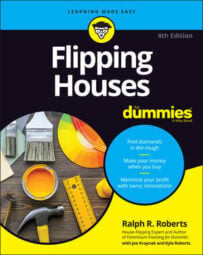- Are you going to live in the house while fixing it up?
- How long can you afford to hold the house before selling it?
- How extensive are the renovations you're willing and able to perform?
When developing a game plan, you want to maximize your strengths, minimize your weaknesses, and fully exploit the opportunities that surround you. Many a flipper have already developed their own strategies that achieve those three goals. By becoming more aware of these existing strategies, you can choose the one that fits you best and perhaps even improvise to invent your own strategy.
Always buy low. If you can't get a house for 25 to 30 percent or more below what you estimate to be its market value, keep looking.
In a sizzling real estate market, you can turn a profit fairly quickly by buying a house, moving in, and then sitting back and watching the real estate values soar. This approach works only if you have time on your hands, are speculative by nature, and have a knack for purchasing houses in a hot market at just the right time. This strategy offers several benefits:- If the market remains strong, your property value rises without your having to lift a finger.
- Your equity in the property rises, boosting your borrowing power for other investments.
- By living in the home for two years or more, up to $250,000 of your profit ($500,000 for a couple), is tax free, at least according to the tax laws as of late 2006.
Buying into a hot market also carries some significant risks:
- In areas where property values are soaring, the housing bubble may burst, leaving you with a home that is worth less than what you paid for it.
- Stuff happens. You can have a great house at a great price in a hot market with the top agent working to sell it, and the house still may not sell. Prepare yourself for all possibilities.
What goes up sometimes comes down — sometimes very quickly — but all markets can be good for investing as long as you recognize the conditions and opportunities and react appropriately.

